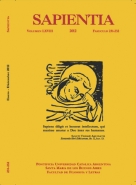Por favor, use este identificador para citar o enlazar este ítem:
https://repositorio.uca.edu.ar/handle/123456789/3892| Título: | Alcance y límites de la potencia humana | Autor: | Donadío Maggi de Gandolfi, María C. | Palabras clave: | Tomás de Aquino, Santo, 1225?-1274; POTENCIA; VOLUNTAD; PERSONA HUMANA; FILOSOFIA | Fecha de publicación: | 2012 | Editorial: | Pontificia Universidad Católica Argentina. Facultad de Filosofía y Letras | Cita: | Donadío Maggi de Gandolfi, M. C. Alcance y límites de la potencia humana [en línea]. Sapientia. 2012, 68 (231- 232). Disponible en: https://repositorio.uca.edu.ar/handle/123456789/3892 | Resumen: | Resumen: La visión sobre el modo de ser del hombre condiciona, de un modo u otro, su actuar en el mundo. En general, es éste un punto de partida compartido por las distintas corrientes filosóficas al momento de dar respuesta al ejercicio del potencial humano, si bien pueden distanciarse drásticamente al sustentar el pasaje ser-obrar. En este sentido, entre las formas más alejadas entre sí cabe reparar, por una parte, en una concepción que recurre a la justificación de una metafísica realista que reconoce la dialéctica de la participación y, por otra, en una concepción que se declara anti-metafísica al disolver el ser en su negación, en la nada, para exaltar la voluntad de poder del hombre. Si bien este trabajo se desarrollará en el marco de la primera concepción, desde el estudio de la causación del acto de ser en Tomás de Aquino, habré de recurrir a la segunda concepción, en particular al nihilismo nietzscheano, solamente como planteo del estado de la cuestión, buscando remover críticamente una objeción recurrente en la historia del pensamiento sobre el alcance y límites de la operación humana. Abstract: Man’s view of his manner of being conditions his acting in the world in one way or another. Generally speaking, this is a starting point shared by the different currents of philosophical thought when it comes to giving an answer to the exercise of human potential despite the fact that these can differ greatly as to how to explain the passage of being-acting. In this sense, among the explanations, which are the farthest from each other, it is important to consider, on the one hand, a conception which relies on metaphysical realism and recognizes the dialectic of participation and, on the other, a conception which claims to be anti-metaphysical by diluting being in its denial, in the nothingness, thus exalting man’s will power. Although this work will be developed following the former, from the study of causation of the act of being in Tomas Aquinas, I shall draw on the latter, namely Nietzschean nihilism, but solely as a way of establishing the status quaestionis, seeking to remove critically a recurrent objection throughout the history of thought on the scope and limits of human operation. |
URI: | https://repositorio.uca.edu.ar/handle/123456789/3892 | ISSN: | 0036-4703 | Disciplina: | FILOSOFIA | Derechos: | Acceso Abierto | Fuente: | Sapientia, 68 (231-232) |
| Aparece en las colecciones: | SAP - 2012 Vol LXVIII nro. 231-232 |
Ficheros en este ítem:
| Fichero | Descripción | Tamaño | Formato | |
|---|---|---|---|---|
| alcance-limites-potencia-humana.pdf | 223,77 kB | Adobe PDF |  Visualizar/Abrir |
Visualizaciones de página(s)
1.325
comprobado en 30-abr-2024
Descarga(s)
134
comprobado en 30-abr-2024
Google ScholarTM
Ver en Google Scholar
Este ítem está sujeto a una Licencia Creative Commons

